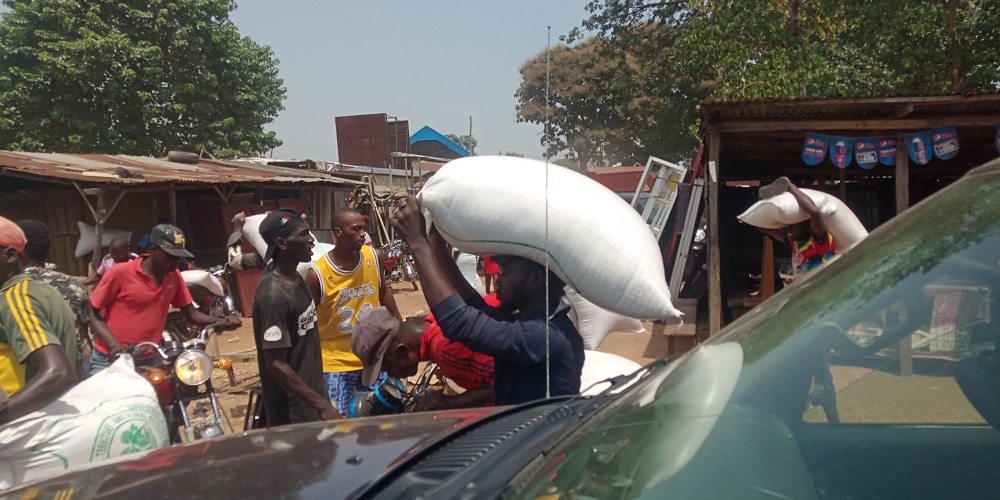The discordant tunes sang last week by a number of governors offer us glimpses into the controversial, if not chaotic, N5 billion reportedly granted to each of the states as palliative by the federal government to cushion the effects of the withdrawal of fuel subsidy.
Let me begin with Borno State. With considerable brio, its governor, Professor Babagana Umara Zulum, last Monday, in the full glare of the media, distributed foodstuff to 12,200 vulnerable households in Muna, Customs and Ngwom communities of his state.
According to Zulum, the 12,200 beneficiaries comprised 7,000 male heads of households and 5,200 female households. Each male reportedly received a bag of rice and one bag of sorghum grain while the females received a carton of pasta and one wrapper.
Even though the governor did not confirm if the female beneficiaries were the wives of the male recipients, and even though he did not aver if the largesse will extend to other vulnerable communities in the state, he was quick to underscore the fact that he was acting in lockstep with the federal government.
The ‘subsidy’ on traditional rulers
Subsidy: A/Ibom govt partners Navy on marine transportation
This is borne out by his explanation, to wit:”…The president has approved the release of N5 billion for states for the procurement of food items to be distributed to citizens. The FG (federal government) is magnanimous enough to approve 52 per cent of the money as grants to states, while 48 per cent, amounting to N1.9 billion, is to be refunded over time.”
Governor Zulum further broke it down as follows: “The president approved N5 billion for states with each receiving N1 billion worth of maize grain and N4 billion cash to buy rice for distribution to citizens.”
In his engagement with elders on Monday last week, Governor Caleb Mutfwang of Plateau State, explained that the N5 billion given to states to succour the poorest of the poor was not a “free lunch” and that part of it was a loan that each state had to repay.
While repeating Governor Zulum’s refrain that (52 per cent was a drive component and 48 per cent was a loan), he disclosed that, as at last week, the state had received N2 billion, and that it was allocated 3,000 bags of rice for the entire state.
Though he was notably silent on the grains dispatched from Abuja, unlike Zulum who was forthcoming, he promised the elders that his administration would further look into the thorny issues of bursary for students and fertilizers for farmers.
The reaction of Governor Godwin Obaseki of Edo State was that of a stern rebuke to the federal government. Addressing journalists in Benin on Wednesday last week, the governor, who has often been a thorn on the sides of the federal government and a barometer for gauging the true state of our parlous economy, dismissed the palliative concept as “fraudulent” and “deceitful”.
Though he did not give details as to how the palliative would be shared to his citizens, he said he would implement measures to “support” Edo people. Obaseki said he was “shocked and scared” of the federal government’s inability to plan and effectively respond to the fuel subsidy removal that has further impoverished Nigerians and inflicted hardship and suffering on them.
Governor Obaseki’s comments coincided with the refutation by the Katsina State government that it had received its own full share of N5 billion palliative from the federal government. Addressing newsmen on Wednesday last week, the Katsina State Commissioner for Information, Culture and Home Affairs, Bala Salisu-Zango, said his state had received N2 billion only and that it had utilised it to procure 40,000 bags of rice, which was distributed in each of the polling units in the state.
It is clear from the above narrative that even though the states are agreed on the ratio of 48 per cent of the N5 billion as a loan from the federal government, to be paid in due course, there seems to be a disconnect as to the template to be deployed for the distribution of these palliatives. In other words, there is no unanimity. This has serious implications for implementation, monitoring and evaluation of the palliatives.
What is also clear is that what will accrue to the beneficiaries, at the end of the day, will be so infinitesimal and niggardly that they will not impact positively on the dirt poor. How do you distribute 3,000 bags of rice to a population of 4,717,300 million in Plateau State? Compounding this conundrum is that no thorough and conscious efforts appear to have been made to identify the dirt poor and to ensure that these palliatives reach them.
If hindsight were to benefit and guide us, the compilation of the list of the so-called poorest of the poor had, before now, been fraught with fraud. This explains the serious reservations of Nigerians towards it.
But if the register for distributing palliatives is susceptible to padding, Nigeria is renowned for making a mess of windfalls and social interventions. From the Gulf War oil windfall under General Ibrahim Babangida to the Paris Club windfall to the hundreds of millions of dollars of the General Abacha loot, which were repatriated, the stories have been sordid. Seldom were these monies invested in productive areas of the economy or infrastructure. Rarely, too, did the monies reach the poorest of the poor. And never did they impact the poor or the economy.
It would have been more salutary and uplifting if the present interventions were to be deployed to address our decrepit infrastructure, health, education or if they were used to subsidize agriculture. The price of fertilizer has shot through the stratosphere with consequences for food production, affordability and security.
Imagine if each of these states were to identify a strategic road in each of its three senatorial districts and invest at least N1.5 billion to build it. Or imagine if each of the states were to build a cottage hospital in each of its three senatorial districts and equip it. Failing the above, imagine if each state, in the manner of the Tertiary Education Trust Fund (TETFUND), were to upgrade its schools by picking a number in each of the three senatorial districts and building either classroom blocks or hostels.
If the states were to invest their palliatives in the above fashion and make allowances for securing their people by procuring 4×4 vehicles to provide logistics for the security agencies, these monies will certainly impact hugely on the people and for the long haul. The poor will find recourse in these roads to transport their produce for a number of years. They will resort to these cottage hospitals when they fall sick. And their children/wards will attend these upgraded schools, thereby empowering themselves.
Such investments will instruct our people not to go for transient hand-outs but make them appreciate enduring projects and the benefits of delayed gratification. It will teach them to take the long-term view of things. And they will instruct them to learn how to fish rather than to be fed fish.
The distribution of niggardly grains only whets the appetite and dulls our people’s determination to produce. It makes people lazy. Rather than ameliorate poverty, it compounds it. Above all, it is an absurdity that is best captured by Albert Einstein: “Insanity is doing the same thing over and over again and expecting different results”.
Dazang is a former Director at the Independent National Electoral Commission (INEC)

 Join Daily Trust WhatsApp Community For Quick Access To News and Happenings Around You.
Join Daily Trust WhatsApp Community For Quick Access To News and Happenings Around You.

